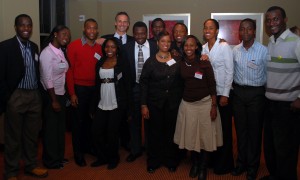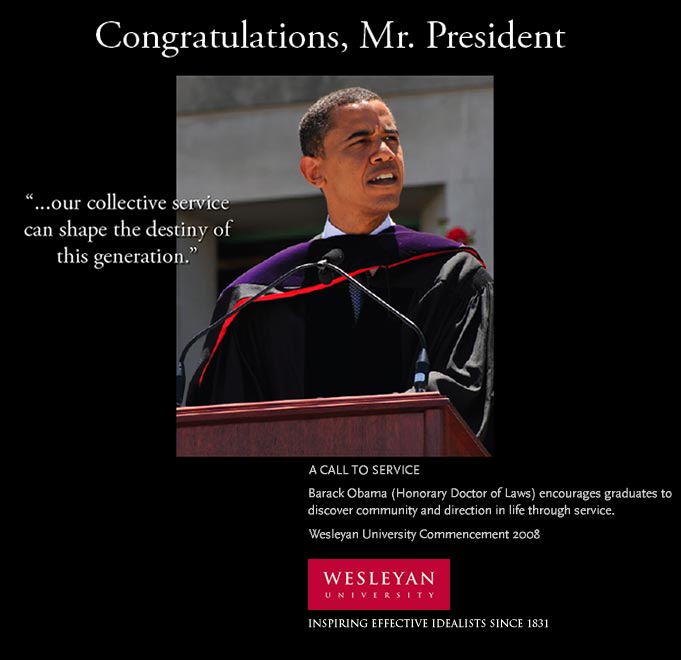Although the temperature was below 20 degrees this morning when I walked to my office, what we call the spring semester is now fully underway. The campus is still blanketed in white, but the icy New England weather makes the snowy landscape deceptively slippery.
One of the most exciting bits of news we had over break was the extraordinary number of applications we’ve received for next year. More than 10,000 students have asked for a place in the class of 2013, a surge of well over 20% from last year. As many of you know, our Early Decision Applications were up over 30%, and we’ve now learned than most of our peer institutions are not seeing anything like this spike in interest. It’s a lot more work for the tireless group in the Admissions Office, but the fact that more and more people are hearing about the great things going on at Wesleyan is very good news indeed.
As I look around at the amazing array of courses offered this term, I can well understand why so many want a crack at a Wesleyan education. Here are just a few examples I’ve taken from the catalogue:
The 60s: Henry Abelove
This course will focus on the 1960’s in the United States. Topics to be considered will include: the civil rights movement, the anti-war movement, the Goldwater conservative movement, gay liberation, second-wave feminism, pop art, the New York School poets, Judson School dance, the new journalism, tendencies and developments within American Protestantism, Catholicism, and Judaism, student movements, the Black Power movement, the rise of Asian American and Latino/a cultural nationalisms, electoral politics, environmentalism, Phyllis Schlafly and the Eagle Forum, the Cuban missile crisis, the counter-culture.
Developmental Neurobiology: Jan Naegele
Near the top of the list of unsolved mysteries in biology is the enigma of how the brain constructs itself. Here is an organ that can make us feel happy, sad, amused, and in love. It responds to light, touch, and sound; it learns; it organizes movements; it controls bodily functions. An understanding of how this structure is constructed during embryonic and postnatal development has begun to emerge from molecular-genetic, cellular, and physiological studies. In this course, we will discuss some of the important events in building the brain and explore the role of genes and the environment in shaping the brain. With each topic in this journey, we will ask what the roles of genes and the environment are in forming the nervous system. We will also discuss developmental disorders resulting from developmental processes that have gone astray.
Zombies as Other from Haiti to Hollywood: Liza McAlister
The Afro-Creole religion of the Haitian majority is a complex system of inherited roles and rituals that Afro-Creole people remembered and created during and after plantation slavery. Called “serving the spirits,” or “Vodou,” this religion and cultural system continues as a spiritual method and family obligation in Haiti and its diaspora, and draws constantly on new symbols and ideas. A small part of Vodou mythology involves the zonbi: a part of the soul captured and forced to work. Vodou, and especially the zonbi, has also captured the imagination of Hollywood and television, and the entertainment industry has produced numerous films and television episodes, and now computer games, with “Zombie” themes. …What constitutes the thought and practice of Haitian zonbi? How is the Zombie represented in American media?…
Of course, I could list dozens of other classes from various parts of the curriculum that I would love to take, or others that are rather intimidating. From the most traditional to the most experimental, you can find it all. I make my own small contribution to this list. After giving a seminar on photography and philosophy in the fall, this term I have my large class, The Past on Film.
A small selection of classes and lectures from Wesleyan can now be found on iTunes. If you look at the iTunes University section of the store, you can search for Wesleyan and see our first group of lectures (all free downloads). We are adding more regularly, so please check back often.
Before long on iTunes and on Wesleyan’s YouTube site you will also be able to find many student performances featured along with faculty presentations. There are auditions going on almost every night on campus at the beginning of the semester. Dance, music and theater are gearing up for performances that will be perfected before finals week. Much to look forward to as winter turns to spring!
[tags] Admissions Office, classes, The 60s, Henry Abelove, Developmental Neurobiology, Jan Naegle, Zombies as Other from Haiti to Hollywood, Liza McAlister, The Past on Film, Wesleyan’s YouTube[/tags]




